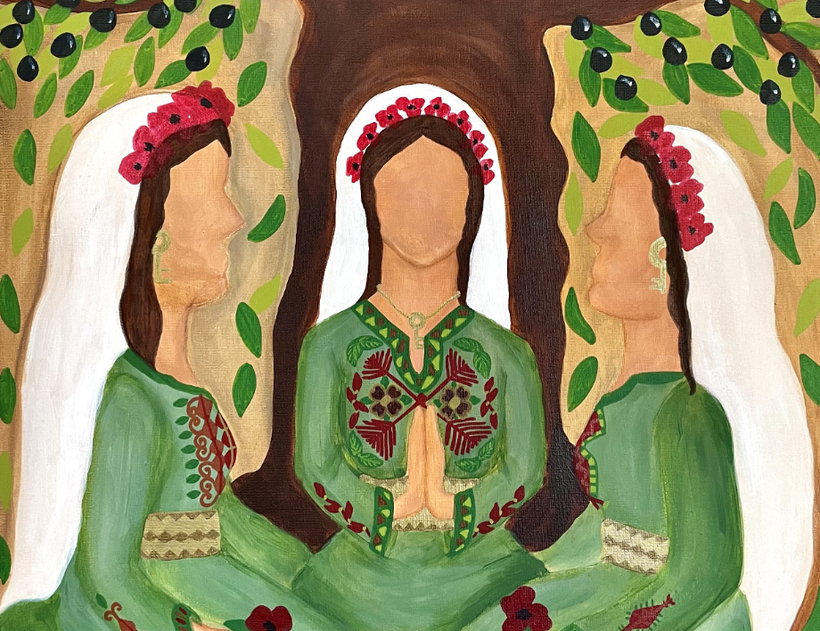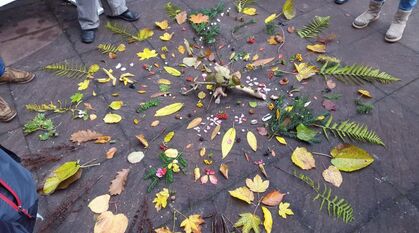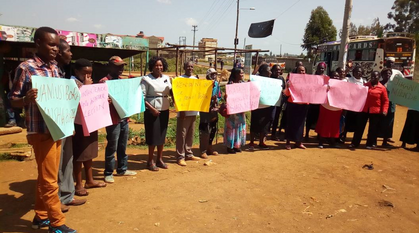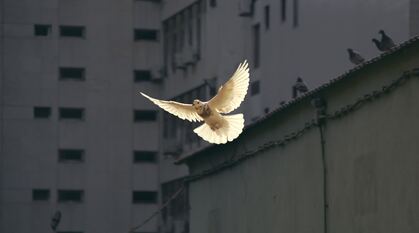Informed prayer, prayerful action: a call from Palestinian Christians
'Informed prayer, prayerful action' describes the World Day of Prayer (WDP) movement. The reading for this year's service on Friday 1 March is from Ephesians 4:2, "I beg you… bear with one another in love." Judy Mason explores the theme behind this year's World Day of Prayer.

The theme and service this year comes from Palestinian Christian women living in Palestine. We are all encouraged to pray for peace, justice and freedom of religion and movement. They ask us to pray especially for women, refugees, the sick, dying and grieving in their country, and also beyond.
Given the focus of news at this present time, here is an opportunity for all of us to show prayerful solidarity with people suffering due to conflict. 'Bearing with one another in love' is desperately needed at this time of war and a good place to start is this annual service, held on the same day in local churches circling the world. The services support the work of the WDP's year-round programme. I encourage all Friends to attend your local WDP service on 1 March and to get involved. World Day of Prayer is an international, inter-church organisation, led by women.
Bearing witness
It doesn't feel like a rash generalisation to say that we are all shocked and horrified by the events that have taken place in Palestine and Israel – the so-called Holy Land – over the last few months. It is distressing, but necessary, to bear witness to this. Through my appointment as Quaker representative to the World Day of Prayer national committee, I have been given the opportunity to do this: studying in depth to share the Palestinian history and much of the background to the present horrendous crisis, in preparation for 1 March. Other members have used the material to prepare a Bible study on the text, to prepare material for children's groups, and to work on the service format, including the music. I find the reflection on the theme of the second-to-last hymn 'Put peace into each other's hands' particular poignant.
By travelling to different regional Preparation Days around the country members of the committee are able to listen to, and usually answer, the concerns of branch secretaries. This can have a ripple effect, as attenders at these days take back to the people in local branches, and into the service on the day, detail which allows the service to include genuinely 'informed prayer' which may lead to 'prayerful action' in the wider community.
The women I work with on this committee represent eighteen different churches yet work together as a cohesive team. The last president of the committee and the present chair have both worked as ecumenical accompaniers, monitoring human rights as part of the World Council of Churches' Ecumenical Accompaniment Programme in Palestine and Israel (EAPPI). We have had the benefit of their deeper knowledge as we prepared. Quakers coordinate EAPPI for the UK and Ireland.
The stories of Palestinian women
Each year the service includes words from three women of the service-writing country. This year the three stories from Palestinian women make difficult but hopeful reading, especially that of Lina (a human rights advocate), whose aunt, Shireen Abu Akleh, was shot dead by Israeli forces on 11 May 2022. Lina's last sentence reads: "Her memory now nourishes the earth from which we will gain strength to continue telling the truth and working towards reconciliation."
All the stories are witness to the hard work required to 'bear with one another in love'. It is easy to give up hope after all that has happened during and since the Hamas attack in Israel on 7 October last year. Working with the committee and especially engaging with these Palestinian stories, I have come to believe that love and loving support are the basis of, and are essential for, hope.
Throughout the year different connections are made that link our committee to the wider WDP community which stretches across more than 170 countries around the world. The movement's roots go back to ecumenical missionary work of the nineteenth and twentieth centuries and to women engaging in work with children and women. This was mainly in Canada and USA, initially against the wishes of male-dominated mission boards. Their work gave rise to the idea of an ecumenical day of prayer. In 1926 women from North America distributed a worship service to many countries, and the Women's' World Day of Prayer was born. In the interests of inclusivity 'Women's' has now been dropped from the title though the extra 'W' is still required for the website.
Receptive ecumenism
This movement is joined in my mind to the idea of receptive ecumenism. One of the ideas around receptive ecumenism is the possibility of benefit to one's own faith, and faith community, of the challenge which comes from truly receiving the essence of another's faith journey. In the WDP committee I learn the different flavours of the spirituality which drives us all. It informs and causes me to question my own faith in a productive way. In this video, John Lennox, the Northern Irish mathematician and theologian, suggests that this exploration of the ideas of others strengthens one's own faith.
From the perspective of the work of other Quaker committees, and Quakers in general, the message of the World Day of Prayer movement might perhaps seem mundane, too narrow and/or focussed on a Christianity which few Quakers would whole-heartedly accept these days. Language appears to block rather than encourage understanding. I believe it is possible to find unity around the first sentence of St John's gospel, 'In the beginning was the word/logos' – in other words the idea, however it is humanly conceived, was there before language. Otherwise to my mind, if this is not true, the universe is devoid of meaning. Is humanity just a virus evolved on this planet to destroy all its life? I cannot have faith in such a proposition.
'Be ye transformed by the renewal of your mind', says Paul (Romans 12:2). Please try what love, expressed in the World Day of Prayer, can do, and what we together can do for Palestine.


